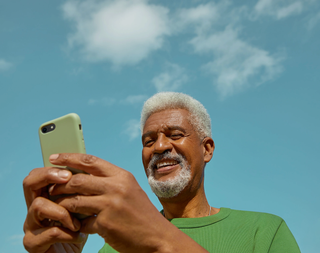Bella’s survival guide for navigating low vision
Bella shares her practical tips for learning to adjust to life with vision loss.


Summary
When vision changes, it’s not just physical. It can be overwhelming, nonlinear, and lonely at first. Bella, who has navigated the uncertainty, grief, and adjustment that comes with permanent vision loss, shares the things that made a difference for her along the way, and the silver linings that might just meet you unexpectedly.
1. Know that your vision might change throughout the day.
Especially when you still have some usable vision - that can really mess with your head. One day it feels manageable, the next it doesn’t. Sometimes even across the same day. “I didn’t realise how much fatigue and changes in light and dark can change my vision throughout the day” she says. “Some days I feel like I’m going crazy, but it’s real. And other people go through it too”.
- Be kind to yourself - vision can fluctuate with fatigue, stress, lighting, and time of day.
- Don’t second-guess yourself - inconsistent vision is common.
2. Find the tools that work for you - Even if it feels early.
I didn’t know how fast or how much vision I was going to lose, but I wanted to be prepared. Learning assistive technology, things like VoiceOver made me feel like I had some control. I don’t always need it, but when I do, it’s there.
- Try screen readers like VoiceOver, even if you don’t use them every day.
- Magnifiers, text settings, screen contrast - learn them early so you’re ready.
- Use what helps - there’s no ‘right’ tool or timing.
3. The Cane - It’s okay to take your time.
I resisted using a cane for a long time. I didn’t feel ready. I didn’t feel like I belonged in that world yet. Everything came slowly, on my terms. And that’s okay. It was a need to feel safe that eventually made me realise I needed the white cane. What if I miss something? What if I injure myself? I knew that I didn’t want to take that risk anymore.
- You don’t have to rush to use mobility aids, it’s your own journey. It’s normal to feel unsure, but when you’re ready, they can bring real freedom.
4. Community - The people who just get it.
Find your community early. The people who get it. They don’t need the whole backstory. They don’t second-guess you.
- Online groups, social media, peer networks - connecting makes a huge difference.
- Talking to others with lived experience can be grounding and validating.
- You’re not imagining things. Others have been where you are.
5. Mental health support - It’s not optional, it’s essential.
You don’t just wake up and feel comfortable with this. It takes time, and honestly, having a psychologist along the way really helped. It’s a significant mental adjustment that requires a support system.
- Counselling or psychology can help process the ups and downs.
- Emotional wellbeing is as important as practical tools.
- You deserve support.
6. You don’t have to have all the answers yet.
There are still fears, but I’ve learned that being prepared, even when it’s uncomfortable, gives me control.
- It’s okay not to know what’s next, you’ll adapt as you go. Preparation brings confidence and control back.
- You don’t have to rush. You are allowed to take your time.
A final thought.
I also know now, after everything, that I’m resilient. And when the next challenge comes - because it will, I’ll find a way to adapt and continue to thrive. That’s what we do.
Did you find this article helpful?
Share your thoughts and help us make our resources better for everyone.
Enjoying the content?
Start building your profile to access personalised support, resources, and tools tailored to your eye health journey.
